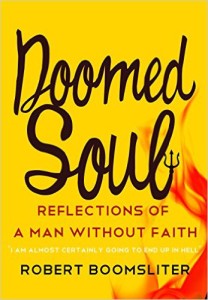
Rather than a carefully set out argument for atheism, Doomed Soul is a collection of essays that mull the subject from a variety of angles: a whimsical essay listing all the people in whose company he’d like to spend eternity, and then noting that all of them are atheists; an editorial explaining why students should be taught religion in schools (not as doctrine, but as a sort of overview of the beliefs and practices of the major religions so that children can make more informed decisions about a choice of faith, if any); an imaginary conversation with God, or with what a god might be; and many other varied approaches to the subject.
Boomsliter shows a willingness, if not to consider that he may be mistaken, to at least consider that he doesn’t have the answers. This is a very refreshing approach in this genre. There is humility here, and I for one, was happy to find it. As a non-believer myself, I have often cringed at the writings of Dawkins, et al, not because I disagree with them, but because their cock-sure attitude and condescending tone seems, to me at least, to make us non-believers look bad. It is in fact, quite possible to be an atheist and not believe that anyone who isn’t is a stupid slug. It is possible to be a freethinker and a rational thinker and not be convinced that you’ve got the entire universe from big bang to the heat death of the universe totally sussed. Boomsliter does a wonderful job of being sure of his position without being arrogant. In the introduction he explains that the motivation for writing the book was the vent some of the resentments he developed after September 11, 2001 — a time when he, and I would expect many other Americans, developed a deep antipathy for religion. And vent he does, but by the end of the book, anger and resentment have given way to something less strident.
Perhaps the best thing in the book is a concise statement of a non-believer’s ethic. “Good,” writes Boomsliter, “is to act so as to improve the well-being and diminish the suffering of my fellow beings. Evil is doing the opposite.” This is as essential as any definition of “the good” can get, and requires no recourse to the supernatural or an afterlife. And I would venture that it is an ethic most non-religious people agree on, and most live by. The world might well be a better place, suggests Boomsliter, if more religious people felt the same way.
I doubt that this book will change any minds one way or the other about religion. But it might spark some interesting and entertaining conversations.
Links
Amazon
Goodreads
Review Overview
Design
Content
Editing
Get an Editorial Review | Get Amazon Sales & Reviews | Get Edited | Get Beta Readers | Enter the SPR Book Awards | Other Marketing Services























Leave A Comment